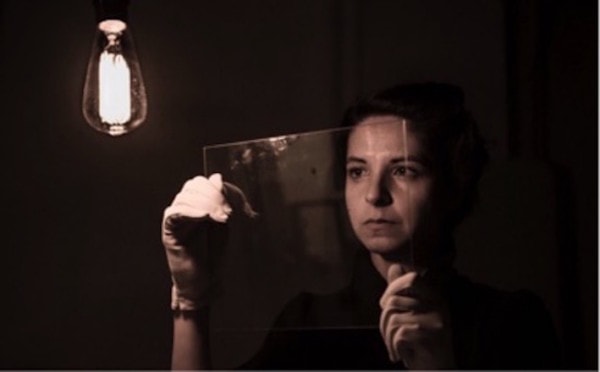Lately, I’ve been getting all my best history lessons at the theatre. Passage of the Civil Rights Act? All The Way has you covered. A new perspective on the Civil War? Try Father Comes Home From the Wars. And of course, everyone’s new favorite founding father is the title character in Hamilton. But as debates about the question of gender parity on and offstage continues to rage, one cannot help but notice that even in the most radical of these high-profile productions, the historical contributions of women tend to fall by the wayside, as they are nudged instead into their traditional roles as wives, mothers and lovers.
Infinite Variety Productions hopes to fill that gap with a mission to tell ‘the untold stories of women throughout history.’ Their most recent effort to this end is Insignificant, a world premier directed by Colleen Britt and running at the Kraine Theater. The title describes the place of humans within the scope of the universe, but not— or so the play comes to argue— the scientific contributions of the female astronomy computers who worked in the Harvard College Observatory in the late nineteenth century, helping create star charts.
The company’s goal of illuminating the brilliance and importance of these forgotten astronomers is laudable, but playwright Sean Michael Welch’s ambition in this respect unfortunately seems to distract him from the business of creating a compelling drama. All of the characters are images and mouthpieces rather than actual people, and as a result, the play stutters and circles without ever achieving the kind of flowing narrative that arises from allowing characters to be propelled by their goals.
The play, which begins with a young British astronomy student (Deanna McGovern) explaining to her mentor (Kathleen O’Neill) why she has decided to essentially retract her own doctoral dissertation before it is even published, eventually splinters into three basic threads: the student, Cecelia Payne, debating with her mentor Annie Jump Cannon about this decision; Annie’s narration of her youth working in this same astronomy department alongside three other women who are frustrated by the mockery and inequality they experience; and the slightly clumsy merging of these two threads in Annie’s efforts to memorialize her friend and colleague Henrietta Leavitt (Ally Illyasova), who died before she could receive proper credit for her astronomical discoveries, and to hold her up as a cautionary tale for Cecelia.
The stories move seamlessly across a largely bare stage, with white curtains serving as surfaces for celestial projections, and veils behind which ghostly voices and faint memories can be obscured. From behind them also pop the male ensemble (Andrew Dunn, Timothy Ellis Riley, and Michael Megliola), who alternate roles as actual figures in the women’s lives, and a peppy encapsulation of turn-of-the-century sexism, haranguing and objectifying the women before twirling their umbrellas and sauntering offstage.
Amusing as these interludes are, by giving the women a symbolic monolith rather than individual antagonists to interact with for most of the play, they typify Welch’s tendency to focus on ideas rather than character. And the ideas under scrutiny are not radical enough to carry a play alone. No one could possibly dispute the fact that the women ought to be respected, ought to be paid a living wage, and ought to receive credit for their own work and discoveries. But the women, especially Antonia Maury (Ashley Adelman, also a producer) and Williamina Fleming (Laura King Otazo) are forced to rehash these same pleas over and over again. Though the performers are all game and clearly invested in the material, none of them are quite able to fill out Welch’s thematic figures into fully rounded characters. With the patriarchy itself as their only obstacle, there can be no forward movement, and it leaves all of the characters as powerless narratively as they are socially: they can only lament or, in Annie’s case, narrate what they have already endured. Welch draws continual attention to the theatrical devices Annie and the women are using to tell the story (“Clear the stage.” “Why?” “For the flashback,” goes one exchange), but the self-conscious tone of this mockery makes the tricks feel clumsy.
Many of these problems are likely a symptom of the same scarcity that Infinite Variety Productions is seeking to remedy. The Royal Shakespeare Company’s recent science-themed play Oppenheimer could feature famous physicists like Edward Teller and Richard Feynman in what amounted to cameos, confident that their stories have been sufficiently told in other arenas, and likely will be again. The very obscurity that Insignificant harps upon may be, in part, what forces it to cast its net too widely: if Annie Jump Canon is the entire focus, then who will tell Cecelia Payne’s story? And Henrietta Leavitt’s? And Williamina Fleming’s?
The only real remedy for this problem is more plays, more movies, more stories. And in seeking to fill an important gap, and to tell an important story, Infinite Variety should be applauded for their vision. But a smaller story, more sharply told, may ultimately serve these intelligent, underappreciated women better.

